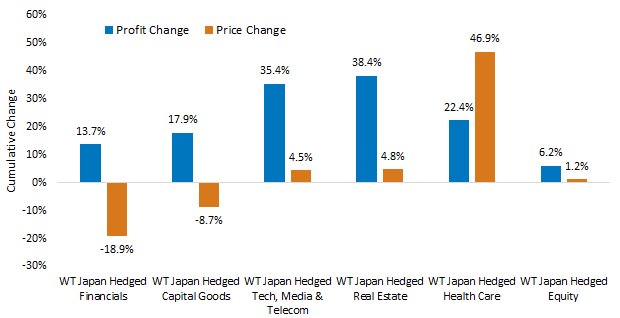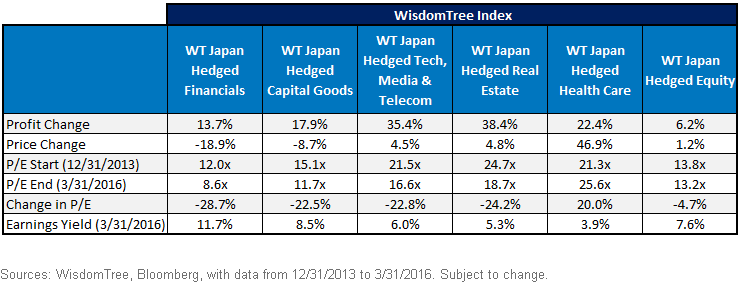The Disconnect between Prices and Profit Growth in Japan



 There are a number of areas within Japan worth considering based on gaps between profit growth and price growth over the last three years:
Financials: Japanese Financials has been the most battered sector over the last three years. The price of the WisdomTree Japan Hedged Financials Index has been down close to 19% since 12/31/2013, while expected profits for the sector have been up 13.7% over the period. The sector has been under pressure recently due to fears about the negative interest rate policy (NIRP) in Japan. But on April 12, the BOJ announced a technical change to NIRP that will reduce the portion of private bank reserve deposits to which negative rates apply. The net effect is a boost to private bank margins that could add back as much as 2% to 3% on operating profits. It is positive not just because of the boost to bank profits but because it confirms policy makers’ flexibility and a shift to correct the BOJ’s policies to be more “pro-market” and “pro-growth.”
Details: The BOJ raised the ratio used to calculate the macro add-on balance in the current account profit margin: financial ratio calculated as net income divided by revenue balances from zero to 2.5%. Changing the ratio will increase the portion of the current account balances to which zero interest rates apply and decreases the portion of bank balances to which the negative rate is applied. The change became effective with the start of the last reserve period on April 16.
There is also expected to be increased support for banks through the application of negative lending rates at which banks can borrow from the BOJ, providing further support for banks.
Real Estate: Prices for the WisdomTree Japan Hedged Real Estate Index have been up only 4% since 12/31/2013, but expected earnings were up 38.4%, the most of all the WisdomTree sector Indexes. This is the one sector that uniformly reacted most positively to the NIRP policy. Lowered borrowing costs and long-term interest rates are most beneficial to real estate, where capital expenditures and borrowing are the highest of any sector. The drop in mortgage rates—with the 10-year Japan mortgage now at 70 basis point (bps) per year1—is stimulating huge growth in mortgage refinancing and should also help provide a boost to real estate developers and construction companies.
Capital Goods: The WisdomTree Japan Hedged Capital Goods Index has faced three severe headwinds: First, this is the sector most exposed to the global economy, so concerns around global growth, particularly China’s, have hit this sector hard. Second, the decline in commodity prices has impacted many of these energy and resources companies, where big expenditures are made to purchase machinery. Finally, in 2016 these companies have been hit by the strong yen. Despite profits being up 18% in aggregate for the sector, prices were down 9% and the sector trades at one of the lowest P/E ratios and highest earnings yields in Japan. Given a stabilization in commodities and receding fears on China, these companies may be well positioned, particularly if the yen starts to weaken again.
Conclusion
In our view, Japan remains one of the better opportunities for global equity investors. Whether one takes broad exposure or targets specific sectors such as Financials or Real Estate, we see a number of opportunities to take advantage of the pessimism that has surrounded Japan recently.
Unless otherwise noted, data sources are WisdomTree and Bloomberg as of 3/31/2016.
1Source: Bank of Japan, as of 3/31/2016.
There are a number of areas within Japan worth considering based on gaps between profit growth and price growth over the last three years:
Financials: Japanese Financials has been the most battered sector over the last three years. The price of the WisdomTree Japan Hedged Financials Index has been down close to 19% since 12/31/2013, while expected profits for the sector have been up 13.7% over the period. The sector has been under pressure recently due to fears about the negative interest rate policy (NIRP) in Japan. But on April 12, the BOJ announced a technical change to NIRP that will reduce the portion of private bank reserve deposits to which negative rates apply. The net effect is a boost to private bank margins that could add back as much as 2% to 3% on operating profits. It is positive not just because of the boost to bank profits but because it confirms policy makers’ flexibility and a shift to correct the BOJ’s policies to be more “pro-market” and “pro-growth.”
Details: The BOJ raised the ratio used to calculate the macro add-on balance in the current account profit margin: financial ratio calculated as net income divided by revenue balances from zero to 2.5%. Changing the ratio will increase the portion of the current account balances to which zero interest rates apply and decreases the portion of bank balances to which the negative rate is applied. The change became effective with the start of the last reserve period on April 16.
There is also expected to be increased support for banks through the application of negative lending rates at which banks can borrow from the BOJ, providing further support for banks.
Real Estate: Prices for the WisdomTree Japan Hedged Real Estate Index have been up only 4% since 12/31/2013, but expected earnings were up 38.4%, the most of all the WisdomTree sector Indexes. This is the one sector that uniformly reacted most positively to the NIRP policy. Lowered borrowing costs and long-term interest rates are most beneficial to real estate, where capital expenditures and borrowing are the highest of any sector. The drop in mortgage rates—with the 10-year Japan mortgage now at 70 basis point (bps) per year1—is stimulating huge growth in mortgage refinancing and should also help provide a boost to real estate developers and construction companies.
Capital Goods: The WisdomTree Japan Hedged Capital Goods Index has faced three severe headwinds: First, this is the sector most exposed to the global economy, so concerns around global growth, particularly China’s, have hit this sector hard. Second, the decline in commodity prices has impacted many of these energy and resources companies, where big expenditures are made to purchase machinery. Finally, in 2016 these companies have been hit by the strong yen. Despite profits being up 18% in aggregate for the sector, prices were down 9% and the sector trades at one of the lowest P/E ratios and highest earnings yields in Japan. Given a stabilization in commodities and receding fears on China, these companies may be well positioned, particularly if the yen starts to weaken again.
Conclusion
In our view, Japan remains one of the better opportunities for global equity investors. Whether one takes broad exposure or targets specific sectors such as Financials or Real Estate, we see a number of opportunities to take advantage of the pessimism that has surrounded Japan recently.
Unless otherwise noted, data sources are WisdomTree and Bloomberg as of 3/31/2016.
1Source: Bank of Japan, as of 3/31/2016. 
Jeremy Schwartz has served as our Global Chief Investment Officer since November 2021 and leads WisdomTree’s investment strategy team in the construction of WisdomTree’s equity Indexes, quantitative active strategies and multi-asset Model Portfolios. Jeremy joined WisdomTree in May 2005 as a Senior Analyst, adding Deputy Director of Research to his responsibilities in February 2007. He served as Director of Research from October 2008 to October 2018 and as Global Head of Research from November 2018 to November 2021. Before joining WisdomTree, he was a head research assistant for Professor Jeremy Siegel and, in 2022, became his co-author on the sixth edition of the book Stocks for the Long Run. Jeremy is also co-author of the Financial Analysts Journal paper “What Happened to the Original Stocks in the S&P 500?” He received his B.S. in economics from The Wharton School of the University of Pennsylvania and hosts the Wharton Business Radio program Behind the Markets on SiriusXM 132. Jeremy is a member of the CFA Society of Philadelphia.

